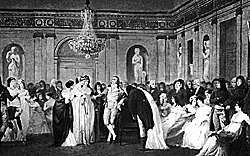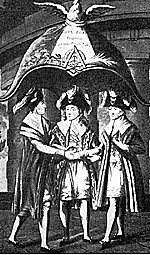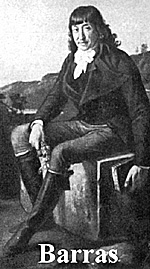The France that the newly installed Directors ruled from the Luxembourg Palace hovered on the edge of collapse. Large numbers of people were starving and the currency was worth less that one thousandth of its pre-Revolutionary value. Predictably, faith in government dropped to an abysmal low. Structurally, the new government appeared similar to that of the young United States in that there were two chambers of elected officials, the Ancients (theoretically 250 members) and the Five Hundred. These two bodies elected the five Directors who acted as the Executive Branch. Once a year, one of the Directors was to be retired by a randomly drawn lot and a replacement elected by the Ancients from a list drawn up by the Five Hundred.
The new government quickly divided into two main factions: The Regicides (also known as Revolutionaries) and the newly elected Constitutionalists. The latter group, much to the horror of the former, had won almost all of the open seats in the recent election. It was clear that the next vote would probably cause a shift in power if the majority in the government went to the Constitutionalists.
To briefly explain the conflicting ideologies, the Revolutionaries were pro-war, anti-Catholic, and supported a complete repression of the families of nobles who had fled the country (the emigres). The Constitutionalists were for peace, religious tolerance, and an easing of the restrictions against the emigres. Furthermore, they advocated adherence to the constitution and decried the exceptional measures allowed under a revolutionary government (most notably, the infamous Reign of Terror from mid-1793 to mid-1794). The Revolutionaries pejoratively called the Constitutionalists "Monarchists", while the latter referred to their opponents as "Jacobins".
At right, Barras, Reubell, and La Revelliere-Lepeaux.
Jean-Francois Reubell
Jean-Francois Reubell (1747-1807) was a lawyer from Alsace. He had been a part of government yet had avoided the pitfalls of both the Terror and the Thermidor reaction in July 1794. He believed in absolute power of the government and the personal looting of the country whenever possible. He could be ruthless, emotional and acrimonious, but his broader capabilities enabled him to steer a careful course during his tenure.
Vicomte Paul-Francois-Jean-Nicolas de Barras
Vicomte Paul-Francois-Jean-Nicolas de Barras (1755-1829) became a hero by leading the military forces during the removal of Robespierre during 9 Thermidor and being in nominal charge during 13 Vendemiaire. His inclusion in the government helped create, with Reubell, a corrupt cartel in which he acquired wealth to such an ostentatious degree that after living a lifestyle that Louis XIV might envy, he was able to retire and live lavishly for the remainder of his long life. Barras typified the licentious and profligate mores of the time and kept various mistresses, including Josephine de Beauharnais before her marriage to Bonaparte.
Louis-Marie de La Revelliere-Lepeaux
Louis-Marie de La Revelliere-Lepeaux (1753-1824) was a notably ugly, bellicose man whose looks did not deter him from being extremely vain. He was a former Girondist (moderates of the early revolutionaries) and remained so in spirit. He was wildly anti-Catholic and lost no opportunity to persecute them. He practiced Theophilanthropism, a Masonic cult that attempted to create a more rational and virtuous version of Christianity. La Revelliere-Lepeaux remained relatively honest while somehow turning a blind eye to the excesses of his allies.
General Lazare-Nicolas-Marguerite Carnot
Honest and pure of character, General Lazare-Nicolas-Marguerite Carnot (1753-1823), the "Organizer of Victory", was the most talented member of the Directory and a devout Republican. Although he had served on the Committee of Public Safety during the Terror, Carnot survived Thermidor because of his service to the country in raising and administering the Revolutionary armies, and for his reputation of being above political infighting. His disgust at what transpired during the Terror placed him primarily in the Constitutionalists's camp. He continued to support the government even after it was clear that there were fellow Directors who would gladly have him arrested and killed to further their cause.
Louis-Francois Letourneur
Louis-Francois Letourneur was essentially a nonentity who had been in the shadows of government from the start of the Revolution. He was a Regicide who none the less tended toward moderation. A pleasant man who seemed incapable of forming an original political thought, he always sided with Carnot.
The Directory took office on 27 October, 1795. For the next four years, until Bonaparte's coup in November, 1799, it struggled with corruption, insolvency, numerous threats and coups, and two major wars. Its plans to defeat the reactionary European forces allied against France went awry when Bonaparte's Army of Italy, supposedly merely a sideshow to the main offensive in Germany, achieved the only notable successes in 1796-1797. Napoleon's triumphs led to the break up of the First Coalition at the Peace of Leoben on 18 April, 1797. Although the Directory had little influence in the terms of that agreement, it still managed to throw away the fruits of the victory when its actions encouraged a Second Coalition to attack France in early 1799.
Initially, the Directory achieved some minor improvements in government efficiency, but little was accomplished until the huge flow of loot, particulary hard currency, began to arrive from victorious General Bonaparte in mid-1796. The government's tenuous hold on power was tested almost from the start when a planned coup of the far left led by "Gracchus" Babeuf, a man sometimes credited with being the father of Communism, was uncovered and crushed. He and many others of the radical wing of the Jacobins were arrested on the day of Napoleon's victory at Lodi, 10 May, 1796; Babeuf's execution took place a year later on 27 May.
Plots
Plots to overthrow the government seemed ubiquitous during this unstable time, and one of the more dangerous came when General Pichegru, in constant contact with the emiges, conspired in 1795 and 1797 to betray the nation and march to restore the Bourbon monarchy. Although his activity was temporarily covered up by General Moreau and others, the threat had been serious. (Pichegru would finally be arrested in 1803 for plotting to overthrow First Consul Bonaparte.)
The election in the spring of 1797 confirmed the Revolutionaries's worst fears. Their slate of candidates were decisively defeated at the polls and the Constitutionalists now held a majority in both houses. Marquis Francois de Barthelemy was elected to replace Letourneur, who had been removed by "random lot". This former ambassador to the Swiss was firmly in the majority camp. The new government soon began to put their programs into place. Religious tolerance for the Catholics was instituted.
A Royalist faction of the Constitutionalists now freely spoke out in the open. Their activities centered around the Club de Clichy. They were led by Pichegru and Camille Jourdan (brother of the famous general) and stood in opposition to Barras and Reubell. They openly preached the removal of these "Jacobin" Directors and then made the fatal mistake of attacking Bonaparte. Napoleon had until this time been willing to stand on the sideline and await the results of the turmoil, but with the vocal Constitutionalists proclaiming their opposition to him he felt that he must now take sides. Before he could do so, however, Barras looked for help elsewhere. He solicited the assistance of the great revolutionary general, Lazare-Louis Hoche, who was supposed to bring a portion of his army to Paris. Hoche, it seemed to Barras, was a much better choice to put down the opposition than the all too-popular Bonaparte.
Unfortunately for Barras, the plot was discovered, and Hoche was summoned to the Directory. Barras had not yet informed his other two allies, Reubell and La Revelliere-Lepeaux, of his plans. With the conspiracy made public, Barras pretended to have no knowledge of Hoche's troop movements. This left Hoche to answer the charges alone, and he departed a broken, dishonored, and disillusioned man. With his health ruined as well, Hoche died on 19 September, removing the man Napoleon felt was his nearest equal. Now Barras could turn to no one except the immensely popular and politically dangerous General Bonaparte.
Napoleon
The young general was governing northern Italy at this time from a chateau outside of Milan. There his friend Miot de Melito urged Bonaparte to march and seize the government. "Ah, the pear is not yet ripe", was the future Emperor's response, and he put his plan into action. First, on 11 July, he sent his aide Lavallette to Paris to report on events. He was also kept in constant touch of proceedings by Charles-Maurice duc de Talleyrand-Perigord. Talleyrand, a former bishop who would later serve as Foreign Minister for the Empire, began to conspire with Napoleon.
Realizing that things were unstable, Bonaparte detached Augereau with about 5,000 men from the Army of Italy to march on Paris. The troops arrived on 7 August, 1797, after the Peace of Leoben. Augereau paraded around Paris proclaiming that he had come to kill Royalists. The majority in both Chambers tried to rally their troops and put out a call for volunteers. Few answered. Wishing to get an unbiased account of what was going on, Napoleon then dispatched Bernadotte to Paris with some of the Austrian flags captured at Rivoli back in January, 1797. Bernadotte's balanced reports allowed Napoleon to act decisively within a couple of days.
From his distant command in northern Italy, Napoleon released information implicating Pichegru and publicly announcing he was willing to act as a bulwark against Royalist plots. Augereau was instructed to obey the three Directors; Barras, Reubell, and La Revelliere-Lepeaux. They, in turn, began to spread rumors that a Royalist coup was imminent.
Fearful of a coup, the assemblies proposed to expose the Radicals. Debate raged but a decision was delayed. Knowing the outcome of a vote would be against their interests, the three Jacobin Directors acted quickly. Their plan was to arrest Carnot and Barthelemy and purge both houses of the most vocal of the opposition. They struck on the night of 17 Fructidor (4 September, 1797).
Striking
Just before midnight a deputation of soldiers came to arrest him. They were confronted in the halls of the Palais Luxembourg by Carnot's brother, who was a General, and his aide. He assured the soldiers he would do nothing to interfere with the arrest. But while his aide led the soldiers on a leisurely tour of the palace, he and his brother Lazare slipped out a side passage and through the gardens by using a key copied with such an eventuality in mind. Lazare Carnot hid in Paris for a fortnight before escaping to Switzerland.
Barthelemy was not so lucky. He and 53 members of the councils were arrested by Augereau's men just after midnight. "By what authority do you act?" one of the deputies asked Augereau. "By the law of the saber" came the quick response.
After a show trial, they were sent to the "dry guillotine", the prisoner colony of Cayenne, where most died of fever. The remaining three Directors justified their extraordinary actions by claiming they were averting a Royalist coup. Believing Carnot dead, they made the mistake of making him a scapegoat. Carnot embarrassed the three remaining Directors by publishing a complete refutation from exile.
In the end, the Directory laid the groundwork for its own downfall at the coup of 17 Fructidor. When, two years later at 18-19 Brumaire (9-10 November, 1799), the frightened councils opposed Bonaparte's coup by invoking the constitution, Napoleon brushed them aside with the reply, "What, the one you compromised at Fructidor?"
 In order to provide our readers with background on events 200 years ago, we present this brief introduction to those men who played such a pivotal role, if largely through their inadequacies, in Napoleon's rise to power.
In August, 1795 the Directoire (Directory) came into power as a result of the Regicides creating a new constitution, the third since 1789. This enabled the men who voted to kill their king the ability to maintain a majority in the Revolutionary government. So much did those who voted for the death of King Louis XVI and Queen Marie Antoinette in January 1793 fear reprisals from the Royalists that they were willing to go to any length to maintain their hold on government. This was proven by the ruthlessness displayed by government forces on 13 Vendemiaire in Year IV of the Republic (4 October, 1795) when forces under 26-year-old General Bonaparte crushed a Royalist uprising in Paris with the celebrated "whiff of grapeshot".
In order to provide our readers with background on events 200 years ago, we present this brief introduction to those men who played such a pivotal role, if largely through their inadequacies, in Napoleon's rise to power.
In August, 1795 the Directoire (Directory) came into power as a result of the Regicides creating a new constitution, the third since 1789. This enabled the men who voted to kill their king the ability to maintain a majority in the Revolutionary government. So much did those who voted for the death of King Louis XVI and Queen Marie Antoinette in January 1793 fear reprisals from the Royalists that they were willing to go to any length to maintain their hold on government. This was proven by the ruthlessness displayed by government forces on 13 Vendemiaire in Year IV of the Republic (4 October, 1795) when forces under 26-year-old General Bonaparte crushed a Royalist uprising in Paris with the celebrated "whiff of grapeshot".
 Of the first five elected Directors, three, Barras, Reubell, and La Revelliere-Lepeaux, were aligned with the Revolutionaries, and the other two, Carnot and Letourneur, with the Constitutionalists.
Of the first five elected Directors, three, Barras, Reubell, and La Revelliere-Lepeaux, were aligned with the Revolutionaries, and the other two, Carnot and Letourneur, with the Constitutionalists.
 Early in the evening Carnot was at dinner when he got word from Barthelemy that Barras had come to him to demand his resignation. Carnot realized the danger, but he refused to believe that the palace guard would fail to protect him. He was wrong!
Early in the evening Carnot was at dinner when he got word from Barthelemy that Barras had come to him to demand his resignation. Carnot realized the danger, but he refused to believe that the palace guard would fail to protect him. He was wrong!
Back to Table of Contents -- Napoleon #10
Back to Napoleon List of Issues
Back to MagWeb Master Magazine List
© Copyright 1997 by Emperor's Press.
This article appears in MagWeb (Magazine Web) on the Internet World Wide Web.
The full text and graphics from other military history magazines and gaming magazines are available at http://www.magweb.com